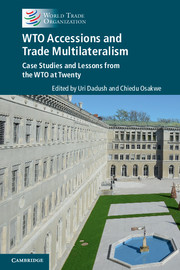Book contents
- Frontmatter
- Dedication
- Contents
- List of contributors
- Foreword
- Acknowledgements
- List of abbreviations
- Editors' note
- PART I WTO accessions, the trading system and the global economy
- PART II Overview: systemic outcomes from accessions
- PART III Members’ perspectives on accession negotiations
- Original members
- Article XII members
- 16 The 2001 WTO accession of China: negotiating experience – challenges, opportunities and post-accession approaches
- 17 The 2001 WTO accession of the Separate Customs Territory of Taiwan, Penghu, Kinmen and Matsu: negotiating experience – challenges, opportunities and approaches post-accession
- 18 The 2004 WTO accession of Cambodia: negotiating priorities and experience – growth and integration eleven years later
- 19 The 2008 WTO accession of Ukraine: negotiating experience – challenges, opportunities and post-accession approaches
- 20 The year 2012: WTO accession of Montenegro – why did we apply to join? Priorities and results
- 21 The 2012 WTO accession of Russia: negotiating experience – challenges, opportunities and post-accession approaches
- 22 The 2013 WTO accession of Lao PDR: specific commitments and the integration of least-developed countries into the global economy
- 23 The 2013 WTO accession of Tajikistan: experience of a landlocked economy in a changing regional economic configuration
- 24 The 2014 WTO accession of Yemen: accession negotiations as an instrument for domestic reform, national security and international cooperation
- PART IV Working party chairpersons’ perspectives on accession negotiations
- PART V Salient features inWTOAccession Protocols
- PART VI Conclusion
- Annex: Contributor biographies
- Index
- Plate section
16 - The 2001 WTO accession of China: negotiating experience – challenges, opportunities and post-accession approaches
from Article XII members
Published online by Cambridge University Press: 05 November 2015
- Frontmatter
- Dedication
- Contents
- List of contributors
- Foreword
- Acknowledgements
- List of abbreviations
- Editors' note
- PART I WTO accessions, the trading system and the global economy
- PART II Overview: systemic outcomes from accessions
- PART III Members’ perspectives on accession negotiations
- Original members
- Article XII members
- 16 The 2001 WTO accession of China: negotiating experience – challenges, opportunities and post-accession approaches
- 17 The 2001 WTO accession of the Separate Customs Territory of Taiwan, Penghu, Kinmen and Matsu: negotiating experience – challenges, opportunities and approaches post-accession
- 18 The 2004 WTO accession of Cambodia: negotiating priorities and experience – growth and integration eleven years later
- 19 The 2008 WTO accession of Ukraine: negotiating experience – challenges, opportunities and post-accession approaches
- 20 The year 2012: WTO accession of Montenegro – why did we apply to join? Priorities and results
- 21 The 2012 WTO accession of Russia: negotiating experience – challenges, opportunities and post-accession approaches
- 22 The 2013 WTO accession of Lao PDR: specific commitments and the integration of least-developed countries into the global economy
- 23 The 2013 WTO accession of Tajikistan: experience of a landlocked economy in a changing regional economic configuration
- 24 The 2014 WTO accession of Yemen: accession negotiations as an instrument for domestic reform, national security and international cooperation
- PART IV Working party chairpersons’ perspectives on accession negotiations
- PART V Salient features inWTOAccession Protocols
- PART VI Conclusion
- Annex: Contributor biographies
- Index
- Plate section
Summary
ABSTRACT
China is among the Article XII members which joined the WTO after its establishment in 1995. Membership of the WTO has served as a major stabiliser and strong accelerator for China's economic take-off, although China's accession commitments were highly demanding. One of the most profound impacts brought about by China's accession has been that the country fully embraced the rules-based spirit upheld by the WTO. Concepts such as non-discrimination, transparency and the rule of law are no longer trade jargon but common words for the general public. To this end, China conducted the largest legislative reform in its history to establish a WTO-consistent legal system. China's accession brought tangible benefits to the Chinese people, quadrupling the gross domestic product per capita increasing people's income and improving people's livelihood. Household income increased from about US$800 to US$3,300, marking an annual growth of 10 per cent. More than 200 million people were successfully lifted out of poverty. As China benefited from integration into the WTO and the rules-based multilateral trading system, it has shared these benefits with other WTO members, including and in particular least-developed countries.
The expansion of the General Agreement on Tariffs and Trade 1994 (GATT) and the WTO is remarkable. The GATT began with just 23 members in 1947 and the WTO now has 161 members. Different countries choose to be part of the rules-based multilateral trading system for different reasons. But there is one common reason behind each and every accession, and that is that it is overwhelmingly in the member's interests to accede. The privileges that other members offer, the security that the trading rules provide and, in return, the commitment by acceding governments to open markets and abide by the rules, have brought tangible benefits to their economies. At the same time, successfully concluded accessions will strengthen the rule-based multilateral trading system and enhance its representativeness.
The WTO accession of China – contributions to China and the WTO
China is among the thirty-three Article XII members which joined the WTO after its establishment in 1995. Membership of the WTO has served as a major stabiliser and strong accelerator in China's economic take-off. During the years since China's accession, the Chinese economy and society have been developing rapidly and the benefits of opening up the economy have trickled down to the average Chinese individual.
- Type
- Chapter
- Information
- WTO Accessions and Trade MultilateralismCase Studies and Lessons from the WTO at Twenty, pp. 439 - 447Publisher: Cambridge University PressPrint publication year: 2015

